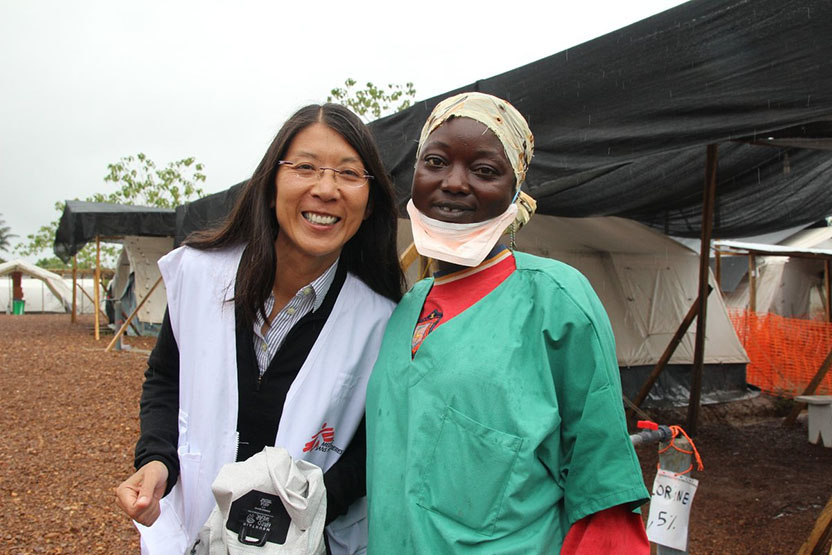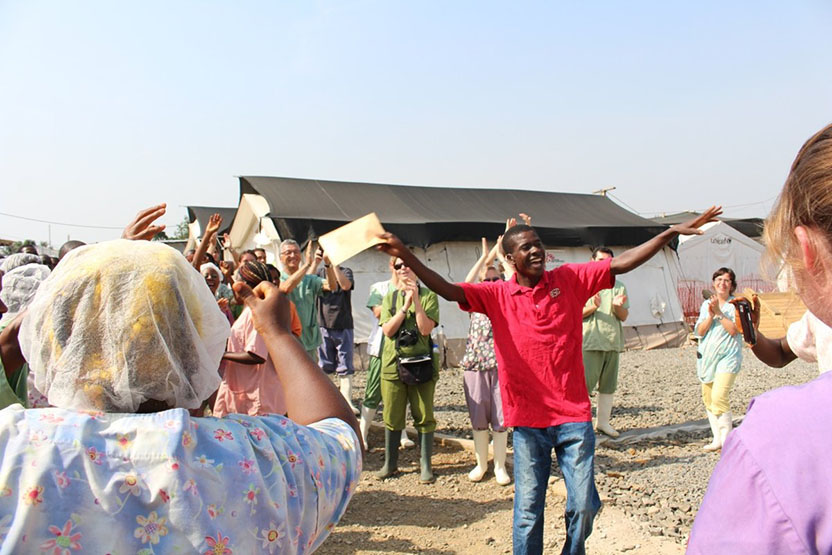
Joanne Liu, International President of MSF, and staff at the Ebola treatment center in Kailahun, Sierra Leone. Photo by P.K. Lee
Demonstrating continued commitment to its goals even after achieving some of the world’s highest recognition and accolades, including the Nobel Peace Prize (for “pioneering humanitarian work on several continents”), MSF has grown and honed its skills at caring for people under devastating circumstances. In 2014, it treated 2.1 million people for malaria, admitted almost 218,000 severely malnourished children to nutritional programs, and performed 81,700 major surgical interventions. It carried out those activities while battling a viral scourge that imposed unprecedented challenges.
Leading the charge against Ebola
In March 2014, MSF leaders realized that Guinea was facing “an epidemic of a magnitude never before seen.” Ebola had struck. Cases were scattered over a wide area, and infection soon spread to other parts of West Africa, especially Liberia and Sierra Leone.
No vaccine, rapid diagnostic tool, or treatment existed for the disease, which kills 50 percent of its victims. People were terrified. Individuals denied that they were sick, governments denied that their citizens were sick, and the World Health Organization denied the severity of the crisis.
On this bleak backdrop, MSF sprang into action. It sent in experts who had responded to multiple Ebola outbreaks, identified infected people, and built isolation hospitals. The organization imported necessary supplies such as chlorine for decontaminating materials exposed to the virus and protective gear that keeps nurses and doctors safe. Its sanitation experts set up systems to ensure that viral particles did not escape and that waste was disposed of properly.
Staff members did everything. They went out with ambulances to pick up sick individuals, decontaminated houses, oversaw funerals to make sure no one got infected from local burial practices, and traced the epidemic. They trained local healthcare workers and eventually participated in clinical trials of new therapeutic agents.
For the first time, MSF had to build a crematorium. The economic infrastructure had collapsed, and it couldn’t rely on airlines or the usual medical evacuation systems.
In this environment, MSF workers undertook the responsibility to treat patients and contain the epidemic at great risk to themselves. For many months, it was alone in its work. UN agencies were absent or were present in a nominal way, without sending hands-on support. In August 2014, the World Health Organization finally stated that the outbreak was “a public health emergency of international concern.” Still, resources remained slim. When other organizations began stepping up, MSF provided guidelines and trained many of their personnel.
Next steps
More than 11,000 people have lost their lives to Ebola in West Africa, including hundreds of health workers. The epidemic is drawing to a close, but immense challenges remain.

John Mulbah celebrates. Mulbah was the 500th patient to recover from a new MSF facility in Monrovia, Liberia. Photo by Caitlin Ryan
Guinea, Sierra Leone, and Liberia never had fully functioning health systems, and what was there has now crumpled. MSF is building maternity and pediatric hospitals, and it is reviving childhood vaccine programs, which have been on hold for more than a year; it is also treating malaria and other endemic illnesses.
Huge numbers of people are traumatized from the epidemic, so the organization is providing mental health care. Furthermore, some Ebola survivors confront lingering problems from their infections as well as social stigma, and MSF has established clinics to help address these issues.
The organization is also pushing for policies and programs that ensure a robust international response the next time the disease hits. It is backing efforts to ensure the development of vaccines, treatments, and rapid diagnostic tools. Toward that end, it is promoting a system in which knowledge gained from research is shared in an open-source database.
Advocacy
Throughout the crisis, MSF has advocated on many levels. From the first days of the epidemic, it has spoken out about counterproductive activities on the ground and issued an unrelenting cry for the world to join the struggle against the deadly disease. It described the dire situation and called for governments and international agencies to provide trained medical personnel. The World Health Organization and its constituent countries are finally beginning to come to grips with what is needed. In May, it announced that it would create a $100M fund that will support an international rapid response system for future outbreaks.
Since its inception, MSF has tackled the world’s most overwhelming disasters that affect the planet’s most marginalized people, and its activities during the last 18 months have demonstrated its exceptional perseverance and effectiveness. The organization spearheaded the campaign against Ebola and modeled how to combat dangerous infections that might some day threaten everyone on Earth.
by Evelyn Strauss



